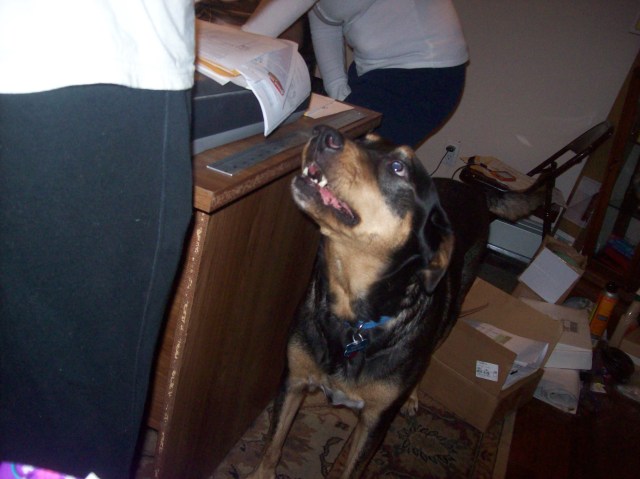Questionour pup is VERY aggressive towards his tail. He growls and bites and tries to chase it. We are worried something is wrong with him
AnswerHi Beth,
Thank you for writing to me about your dog's tail chasing.
Tail chasing is a ritualistic, repetitive, behavior that serves no obvious function. This behavior is often found in cases where animals are confined and where their behavior is restricted, but can be present in ordinary environments. Tail chasing has also been known to be more common in certain breeds, such as Bull Terriers, indicating this behavior may be hereditary in some cases.
The primary causes of excessive tail chasing often involve aspects of learned behavior or medical problems or both
Boredom can cause tail chasing..some dogs require more exercise than other breeds and when they don't get enough exercise, they may resort to repetitive behavior or something like tail chasing.
If the first time your dog chased his tail someone laughed and showed interest, your dog may have interpreted this as a way to gain more attention and approval and therefore repeated it.
Dogs get anxious just like humans do but because they are limited in how they can express it, they may resort to repetitive behavior such as tail chasing.
Neurological conditions can also cause behaviors such as whirling. Severe tail chasing has been attributed to psychomotor epilepsy and sometimes described as a seizure-related problem. There could be a brain disorder associated with dopamine urnover.. This becomes important when drug treatment is to be considered. In Bull Terriers, a breed that has been historically associated with dog fighting, it has been speculated that there may be a reduced pain perception, genetically passed on as an adaptation from the fighting generations.
It is essential that you keep a record of the behavior which would include the duration, frequency, intensity of the tail chasing and your dog's history. Your vet needs this information to help determine the cause of the problem.
If you think that this condition might have been caused by some kind of attention when it first started, then you would have to go cold turkey in the attention department..that means, ignoring it completely. There is also counter conditioning where you would give a reward or attention when your dog is not chasing it's tail and then totally ignore him when he starts the behavior.
If this is a neurological problem it can best be treated with medication. Perhaps something like acupuncture could be helpful. Dopamine antagonists and opiate receptor blockers can be very helpful. Often drug therapy in combination with behavior therapies have been proven to be effective in treating stereotypies including tail chasing. It will be up to your vet to determine the course of treatment.
My advice is to make an appointment with your vet who may refer you to a specialist.
Best Regards,
Shelley Davis

 new puppy
Question
bella
I adopted a puppy from the humane
new puppy
Question
bella
I adopted a puppy from the humane
 old age dog
Question
he was barking!
I have a Dog who is a german s
old age dog
Question
he was barking!
I have a Dog who is a german s
 Shaving a Pomeranian
Question
Brandy my Pomeranian!
I have a few ques
Shaving a Pomeranian
Question
Brandy my Pomeranian!
I have a few ques
 pugs
Question
micah and lacy
my male and female are the same
pugs
Question
micah and lacy
my male and female are the same
 Eye problems w/ schnauzers
Question
Mini parti schnauzer
We currently have a 14 yr
Eye problems w/ schnauzers
Question
Mini parti schnauzer
We currently have a 14 yr